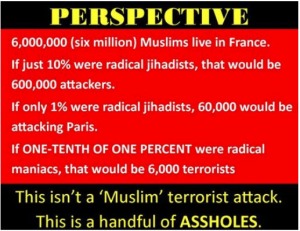When I first heard of the terrible events in Paris, my heart, like most everyone’s, went out to the victims—the dead and wounded—and their families. I continue to pray that they will find the support, answers, and comfort that they need. Like all patriotic Americans, I stand with our friends in France. And as a Christian who believes that all human beings are children of God, I pray for my brothers and sisters who I’ve never met in this life.
But at the same time I mourned the dead, I feared for other innocent children of God who had no complicity in these awful attacks but who were and are likely to be punished for them anyway: the refugees from the Middle East who are searching for a new life in Europe. The people who are leaving behind everything they know in order to escape from places where what happened once in Paris happens monthly, weekly, or sometimes every day.
I decided to write a blog post encouraging charity and compassion toward these fellow human beings. This is not that blog post. At least, not in its originally intended form. I wasn’t even halfway through before this little gem appeared on my facebook feed:
Laying aside the fact that this reprehensible meme equates all Latino immigrants to ISIS terrorists, it’s despicable on a number of other levels. Unfortunately, the prejudice in my feed didn’t stop there. One friend of mine went so far as to declare that the refugees’ culture was “alien to the West,” implying that a person couldn’t be a Muslim and a law-abiding citizen of a Western country. That there was some kind of either/or choice between the two. And a military friend of mine posted, in part:
“Talk however big a game as you want, the fact remains that inviting these refugees in, while it may be intended as a good gesture, also invites in the terrorists and those terrorists will do what it takes to kill innocent people before we kill them. They are the wolves among the sheep.”
All this because one of the Paris attackers is thought to have come to Europe with a Syrian passport, posing as a refugee.
Two facts: One, if that particular terrorist had been stopped at a border wall, the attacks would still have happened. The mastermind appears (with the information available to me at this writing) to have been a homegrown extremist from Belgium. Two, if he was as fanatical as we are justified in assuming, he probably would have found another way in, whether legal or illegal. Walls can be burrowed under, climbed over, and traveled around. They’re not a panacea.
Now, it is baldly true that if there were no Muslims in Europe, there would be no Islamic terrorism there. But the only way to achieve that would be to forcibly expel all the Muslims living there, including ambassadors and embassy staff, not to mention all natural-born Europeans who have chosen to convert. That’s a level of government-sponsored violence on par with the Holocaust—to say nothing of violating the Western principle of religious freedom. We can’t do that and still claim to be an enlightened culture. Thankfully, no one (that I’ve heard of) is actually suggesting this.
But stopping the flow of refugees doesn’t do any good either. It just proves ISIS’s propaganda claim that the West is intentionally trying to hurt Muslims. As George Takei said:
“There no doubt will be those who look upon immigrants and refugees as the enemy as a result of these attacks, because they look like those who perpetrated these attacks, just as peaceful Japanese Americans were viewed as the enemy after Pearl Harbor. But we must resist the urge to categorize and dehumanize, for it is that very impulse that fueled the insanity and violence perpetrated this evening.”
When we “categorize and dehumanize,” as Mr. Takei put it, we fail to see the things we have in common with those who may look or dress like our true enemies. Mr. Takei has firsthand experience with this—he grew up in one of those internment camps that Japanese Americans were relocated to during World War II. And even though the perpetrators of this heinous crime committed it in the name of their perverted brand of Islam, we have to keep in mind that most Muslims are appalled by and opposed to terrorism. Even our own news media has a hard time realizing that all “Muslim countries” are not the same—and that’s not Fox News, either. But Malaysia and Turkey and Saudi Arabia are as different from each other as Sweden is from Uruguay. Or the United States is from Malta. There are real problems that need to be addressed, but we can’t hope to resolve them if we blindly assume that the 1.6 billion Muslims in the world are all somehow carbon-copies of each other. Assuming that all Muslims are terrorists is like saying that all Koreans are hackers or that all Mormons are polygamists. These statements are blatantly false. And going back to my friend’s assertion that Western culture and Muslim religion are somehow antithetical, consider this meme:
I don’t know if the numbers are strictly accurate, but they do a good job illustrating the orders of magnitude involved here. The number of Muslims who are terrorists is shockingly small—minuscule, even. There are hundreds of thousands of refugees seeking asylum in Europe, and so far one of them has turned out to be a terrorist. I’m not saying that we shouldn’t be reasonably cautious—it would be wise to do background checks on these migrants (and I bet they would agree to them)—but we must not let paranoia rob us of our chance to love our neighbors as ourselves. As God taught the Israelites in Moses’ day, “But the stranger that dwelleth with you shall be unto you as one born among you, and thou shalt love him as thyself” (Leviticus 19:34). If we, as Christians, claim to follow Jesus’ command to “love one another” (John 13:34), how can this Biblical principle not still apply? If we ever hope to prove that Christianity is not on a crusade against Islam, we need to begin living our own religion.
There are practical rewards for compassion as well. As one writer opined in the Rolling Stone (of all places):
“To win the War on Terror, to actually defeat the terrorists, we have to dry up their recruiting once and for all. We have a chance of doing that by showing Muslims everywhere—Muslims targeted by terrorists in their homeland—that we stand with them as fellow humans, and that when they face violence and oppression in their homelands, we should welcome them in ours. Even if the Paris terrorists turn out to have come from Syria . . . we should still open our doors to more Syrians and other Muslims escaping extremism.”
“It will take a very long time to make a difference—generations. But if we want a world where terrorists can no longer recruit young people to give their lives to senseless murder, we have to show that the United States is not their enemy. Welcoming those fleeing terror is a critical first step. And rejecting refugees won’t keep terrorists determined to attack us from finding a way in.”
America is a country of immigrants, and we’ve learned time and again—with the Irish, the Germans, the Italians, and now the Latinos—that immigrants gradually do assimilate. Don’t expect it of the first generation, but do look for it in the second and especially the third. And a warm, loving welcome to a peaceful new home will only serve to accelerate the process. Coldness and hostility will have the opposite effect; ostracizing immigrants will make the terrorists’ invitations seem all the more reasonable and enticing.
Let us give our Muslim brothers and sisters a new home, one where they can feel welcome, wanted, and accepted. We have so much we can learn from each other. And in truth, we all face the same enemy. Terrorists kill far more Muslims than they do anyone else, and they have throughout this millennium. Let us refrain from acting out of anger and fear in ways that fit the terrorists’ twisted narrative. Let us instead act according to our Christian values of charity, hope, compassion, and love. Let us be the good Samaritan in this international crisis, not the people who look the other way.
I believe that we as a people will be blessed with peace according to our compassion and cursed with more terrorism according to our heartlessness.
UPDATES
First of all, a good Christian on the Internet created this meme:

(Funny how so many of the states rejecting refugees are in the “Bible Belt.” If they don’t follow the Bible, should the belt be renamed?)
More importantly, the Salt Lake Tribune reports that the First Presidency of The Church of Jesus Christ of Latter-day Saints is sending out a letter encouraging all members of the Church to help refugees. If you’re a Mormon who’s against taking in said refugees, this should give you pause.

